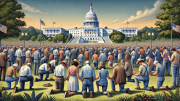It’s Breaking Our Brains
By J. Jeff Toler for Shenandoah Christian Alliance j.toler@sca4christ.org
- “From Issachar, men who understood the times and knew what Israel should do—200 chiefs, with all their relatives under their command” —1 Chronicles 12:32
Quite a few years ago, a friend and I were talking, and he told me about his experience writing letters to the editor of our local paper, The Ventura County Star. Most newspapers—even the locals—were even then, like now, very left-wing. In fact, he liked to call this one the “Ventura County Red Star.” He admitted it wasn’t easy to get a letter published and that it took him a few tries before they let one get in.
“Maybe you might like to give it a try,” he said. “There’s this politician that’s giving Christians a hard time about bigotry and slave reparations.” So, I read his piece, and I thought I would take the challenge. To be honest, I don’t really remember what I wrote anymore, and I lost the clipping somewhere along the way. All I remember is that it was my first experience writing a letter to the editor, and they published it.
That, for me, was a bit of a rush. I also think it annoyed my friend. Although we laughed about it, he didn’t bring it up much anymore.
Letters to the editor have become as anachronistic as “Members Only” jackets or manual transmissions. You really don’t see them all that much anymore, and no one really wants to go back to that. In those days, the editors required you to put your name on your letter. That just wouldn’t work for most people today who prefer their anonymity when writing their screeds.
Anonymity is but one part of the cultural discourse these days. But it’s not just about being shy. It’s about being brazen, confrontational, and threatening under the cover of a crowd.
Dennis Prager once opined on the dangers of anonymity in social media and online dialog in a post written all the way back in 2007.
This is what he said: “Whenever people lament aspects of the Internet, they are most likely to lament the net’s ubiquity of pornography. Only God knows, for example, how many kids, searching for some government information, typed in ‘whitehouse.com’ [edit: it was once a porn site] only to be greeted by pornographic images. Happily, the website changed hands in 2004. It is almost impossible to completely avoid such imagery even with filtering programs.”
“But there is something at least as awful—and arguably more destructive—that permeates the internet: the lies, vitriol, obscenities, and ad hominem attacks made by anonymous individuals on almost every website that deals with public issues.”
[https://www.creators.com/read/dennis-prager/10/07/internet-anonymity-is-as-destructive-as-internet-porn]
I will admit I consume a lot of online content: Daily Wire, Breitbart News, The Blaze, or National Review. The commenters who post at the end of a story can be a fairly good gauge of what the average reader is thinking—or feeling—and can be very informative. Ninety percent of the time, these people prefer an avatar over their name. The days of letters to the editor are over.
Then, editors reading the letters were the gatekeepers who steered opinions—theirs and yours. Gatekeepers would only operate from guidelines formed by consensus and higher authorities. In that social construct, it was understood that rules were to be followed. People couldn’t just say anything they wanted without repercussions. There were standards to be maintained, or otherwise face ostracism.
Thirty years later, who are the gatekeepers now? To what standard do they hew? In the world of social media, what do subscribers—or consumers, if it’s offered for free—expect from the content they are offered? Truth? Validity? Verification?
We call the people who talk to us on YouTube “content providers.” We used to depend on radio and television broadcasters, journalists, or maybe editorialists. Now, we accept the bona fides of content providers with not much more to go by than the gauge of their popularity.
Take for example The Joe Rogan Experience podcast—available on Spotify and YouTube. It commands a massive audience across multiple platforms, including 19.4 million subscribers on YouTube and over 3 billion total views. On social media, Rogan has 19.7 million Instagram followers and 15 million followers on X (formerly Twitter).
[https://www.newsweek.com/joe-rogan-podcast-slipping-charts-third-2037713]

Joe Rogan
These are his bona fides: he’s a comedian, podcaster, mixed martial arts (MMA) commentator, and former television host of the reality show Fear Factor (2001–2006). In 2020, he signed an exclusive licensing deal with Spotify reportedly worth $100 million.
His audience—mostly aged 18–44—is a mix of educational backgrounds and income levels. They reportedly lean more conservative than left of center.
[https://www.youtube.com/watch?v=E8hkAuo09V0]
Before his election, Donald Trump appeared on The Joe Rogan Experience. It lasted nearly three hours. Some say it was a factor in his winning.
How the Internet Is Breaking Our Brains
This is the title of the Jordan B. Peterson podcast with guest Sam Harris.
[https://www.youtube.com/watch?v=bUA2fUPQ9hY]
It’s a wide-ranging conversation offering discussion—not dialogue—on how the internet age is developing a troubling trend in the lapse of standards, the rise of antisemitism, and iterability—the bridge between morality and objective truth.
[https://en.wiktionary.org/wiki/iterability]
I can’t say that iterability is necessarily a healthy trend.
The problem with celebrities is, as it’s always been, the dearth of credibility earned from education, experience, and expertise. Credibility is the result of due diligence, discernment, asking the right questions, and expecting truthful answers.
Both Harris and Peterson are wary of content providers like Rogan, as well as Candace Owens and Tucker Carlson, speaking about them in critical terms. I agree with Harris that Owens has publicly said and written things that would warrant that.
[https://www.jns.org/candace-owens-doubts-mengele-experiments-calling-them-propaganda/]
Carlson, also jumping on the antisemitism bandwagon, once introduced his interview guest Darryl Cooper as the “greatest historian working in America today,” then midwifed his very misleading conversation by letting him tell us Winston Churchill prolonged the Second World War and that the Holocaust happened because of food shortages.
This is where America is heading unless those of us old enough are able to prevent the historical record from being shredded: straight off the cliff.
I used to think a lot of Carlson and Owens. Not anymore. Rogan? Meh. But he’s not off the hook either, because he, like the others, is using his platform and celebrity unwisely. His problem is in thinking all he needs to do is interview and let his interlocutor say whatever he or she pleases.
We are running out of time, my friends. This is how America perishes: we all get to say what we want. But we are neither governing nor being governed wisely.
Photo by David Matos on Unsplash





